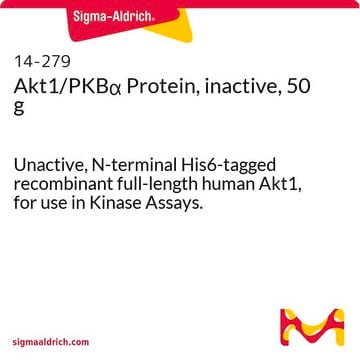This product is supplied in powder form. The solubility in water is 50 mg/mL, resulting in a hazy solution. To prepare a 1% Methylcellulose solution in cell culture media from this stock solution, follow these steps:
A 1% solution requires 1 g of solute per 100 mL of solution, equivalent to 10 mg/mL. The stock solution is 50 mg/mL. To achieve this, take 20 mL of the 50 mg/mL stock solution and dilute it to a total volume of 100 mL.
推薦產品
生物源
synthetic (organic)
產品線
BioReagent
形狀
powder
技術
cell culture | mammalian: suitable
黏度
12-18 cP, 2 % in H2O(20 °C)
溶解度
water: 50 mg/mL, clear to hazy
SMILES 字串
[*]OC[C@H]1O[C@@H](O[C@@H]2[C@@H](CO[*])O[C@@H](O[*])[C@H](O[*])[C@H]2O[*])[C@H](O[*])[C@@H](O[*])[C@@H]1O[*]
InChI 密鑰
YLGXILFCIXHCMC-JHGZEJCSSA-N
尋找類似的產品? 前往 產品比較指南
一般說明
應用
- 在经口管饲法中作为药物二甲双胍的溶剂
- 在乳腺球培养中,作为乳腺上皮细胞生长培养基的组分
- 在悬滴法球状体侵袭试验中,作为球状体三维共培养补充剂
生化/生理作用
儲存類別代碼
11 - Combustible Solids
水污染物質分類(WGK)
WGK 1
閃點(°F)
Not applicable
閃點(°C)
Not applicable
個人防護裝備
Eyeshields, Gloves, type N95 (US)
從最近期的版本中選擇一個:
分析證明 (COA)
客戶也查看了
條款
Hematopoietic stem cell culture protocols for isolation, expansion, and differentiation of CD34+ cells including CFU assays.
CD34+細胞的分離、擴大和分化的造血幹細胞培養方案,包括CFU測試。
-
How to practically reach a 1% solution of Methylcellulose in cell culture media that can't be heated excessively?
1 answer-
Helpful?
-
-
I would like to use methylcellulose in my cell culture media to optimize organoids in suspension. What methylcellulose product would be the most appropriate? And can I dissolve it directly into the cold media?
1 answer-
The methylcellulose products available are not currently tested for use in organoid suspension. However, a previously available product, S3812, was an IMDM-based stem cell culture medium that included a methylcellulose component with a 4000 cps viscosity, at a concentration of 1%. This would correspond to product M0512. The solubility in cold medium has not been determined. Please see the link below to review the general methylcellulose datasheet which includes a viscosity comparison table:
https://www.sigmaaldrich.com/deepweb/assets/sigmaaldrich/product/documents/183/010/m6385pis.pdfHelpful?
-
-
Can the M7027 pass through a 0.2um filter?
1 answer-
Methyl cellulose has a high molecular weight, and the viscosity of methyl cellulose solutions can also impede its ability to pass through such fine filters, as it can clog the filter pores. For sterilization, a 0.5-1% solution of methylcellulose can be autoclaved using standard conditions (121 °C, 15 psi, 15-20 minutes). Higher concentrations may lead to a portion of the methylcellulose falling out of solution.
Helpful?
-
-
Does this product need to be sterilized after dissolving for use in cell culture?
1 answer-
Solutions of this material require sterilization for cell culture applications. A 0.5-1% solution of methylcellulose can be autoclaved using standard conditions (121 °C, 15 psi, 15-20 minutes). Higher concentrations may lead to a portion of the methylcellulose falling out of the solution.
Helpful?
-
-
Hello sir, I need to know molar mass or molecular weight of this code of Methyl cellulose or tell me how can i calculate can you help me?
1 answer-
The molecular weight is not analyzed on a lot to lot basis. The approximate molecular weight is 88,000 Da with methoxy substitution between 27.5 - 31.5% (weight).
Helpful?
-
-
Can I use this to make 0.5% solution in water which will be used as the solvent to dissolve neratinib and administrate to mice through oral gavage?
1 answer-
This product can be solubilized in water at 50mg/ml which is a 0.5% solution. This product is tested for use in cell cultue, however it has not been tested for in vivo applications. Suitability for in vivo use will need to be validated by the end-user. See the link below for a general product information sheet for Methyl Cellulose. Note product M7140, which is the general research grade of this product. All details for M7140 will apply to M7027.
https://www.sigmaaldrich.com/deepweb/assets/sigmaaldrich/product/documents/251/785/m0512pis.pdfHelpful?
-
-
Can I use this Methyl cellulose, Product M7027, for cloning or plaque assays?
1 answer-
Probably not. Product No. M7027 has a very low viscosity (viscosity 15 cP, 2% solution in water) and is used for thickening culture media. Product No. M0387 (viscosity 1,500 cP, 2% solution in water) is recommended for plaque assays, and Product No. M0512 (viscosity 4,000 cP, 2% solution in water) is recommended for cloning or colony growth assays.
Helpful?
-
-
How do I store a stock solution of Methyl cellulose, Product M7027?
1 answer-
A sterile solution of methylcellulose can be stored at room temperature for up to 1 year.
Helpful?
-
-
What is the Department of Transportation shipping information for this product?
1 answer-
Transportation information can be found in Section 14 of the product's (M)SDS.To access the shipping information for this material, use the link on the product detail page for the product.
Helpful?
-
-
How can I make a solution of Methyl cellulose, Product M7027?
1 answer-
There are two methods for solubilizing methylcellulose. Please see the product insert for Product No. M0387 for the protocols.
Helpful?
-
Active Filters
我們的科學家團隊在所有研究領域都有豐富的經驗,包括生命科學、材料科學、化學合成、色譜、分析等.
聯絡技術服務





